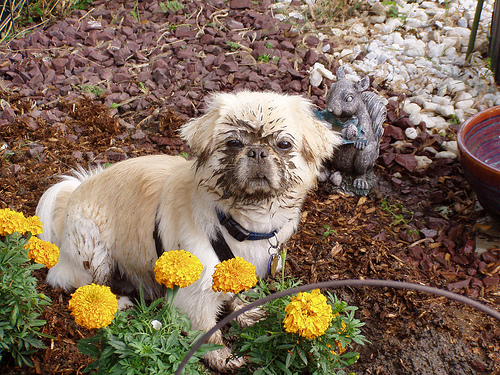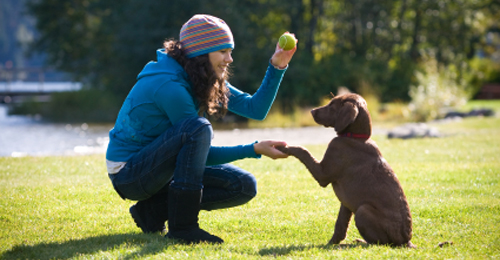Many times after a dog owner completes a group training class or private dog training lessons, the dog's behavior is wonderful. However, after a few months the dog is back to pulling wildly on leash and does not respond to basic commands. Why the transformation? The hard reality is that for training to stick you need to continually practice. Dogs do not stop learning after a basic puppy training course is completed.
The best way to be sure you are practicing your dog's training is to incorporate obedience skills into your daily routine. A common mistake owners make is to discontinue reinforcing new behaviors too quickly. Remember, behaviors that are not rewarded will eventually disappear!
Simple strategies to maintain your dog's training:
1. Keep clear containers filled with treats in several rooms of your home. You do not need to give your dog a treat every single time he performs a behavior you like, but you do need to reward him intermittently. You will be more likely to reward desired behavior if the treats are readily available. Additionally, you will remember to refill the containers if you can visually see when you are running low.
2. Ask your dog to sit or lie down at doorways. If your dog does not comply, simply close the door and ignore him for half a minute before trying again. Do the same thing at every entrance, or even better, do this with interior doors too.
3. Identify routines that enable you to practice training skills every day. For instance, tell your dog to hold a down stay while you cook dinner.
4. Incorporate training with play. Ask for a sit or a down before tossing a ball, giving your dog a new toy or giving your dog access to anything he enjoys.
5. Continue to bring treats on walks so you can periodically reward your dog when the leash is loose. Remember never to continue to walk in the direction of a tight leash.
6. Take up a dog sport such as agility or enroll in obedience lessons with a professional dog trainer to ensure that you do not allow your dog's training to fall apart over time.
7. Keep your dog's life fun and interesting by including him in your activities. Plan vacations to dog friendly locations, take your dog with you on errands and include activities for your dog in your weekend plans. Practicing training skills in different settings is essential.
8. Notice changes in your dog's behavior and do not wait to get help if you see a problem. Talk with your veterinarian to make sure your dog does not have an underlying medical condition. Getting professional help from a qualified dog behavior consultant can prevent small problems from turning into big ones.
Maintaining your dog's training skills is much like getting into great physical shape, you cannot just work out for two months and then hope for the best. You need to incorporate permanent changes into your lifestyle. Fortunately, if you do make a concerted effort, you can not only maintain your dog's skills long after your last training class, but actually improve upon them!

 How To Deal With Dogs That Dig
How To Deal With Dogs That Dig
Digging can be a fr
How To Deal With Dogs That Dig
How To Deal With Dogs That Dig
Digging can be a fr
 How to Balance Your Pets Play and Relaxation
How to Balance Your Pets Play and Relaxation
How to Balance Your Pets Play and Relaxation
How to Balance Your Pets Play and Relaxation
 Games for Dogs: Bobbing for Biscuits
Games for Dogs: Bobbing for Biscuits
Games for Dogs: Bobbing for Biscuits
Games for Dogs: Bobbing for Biscuits
 Teddy Bear Dog
Due for this, the actual who invests in professional canine
Teddy Bear Dog
Due for this, the actual who invests in professional canine
 Dog Dudes: Surfing Dogs
Dog Dudes: Surfing Dogs
Dog Dudes: Surfing Dogs
Dog Dudes: Surfing Dogs